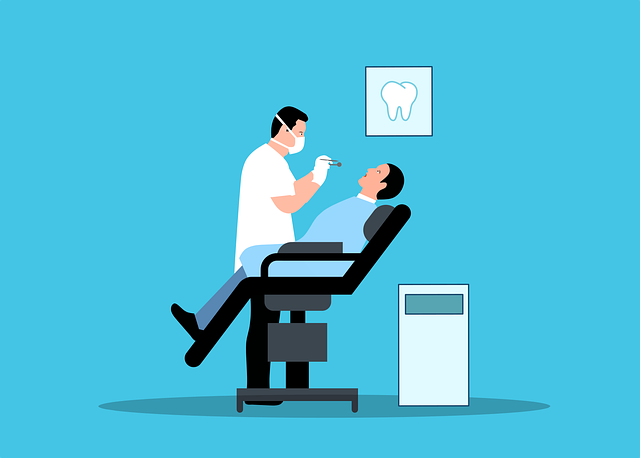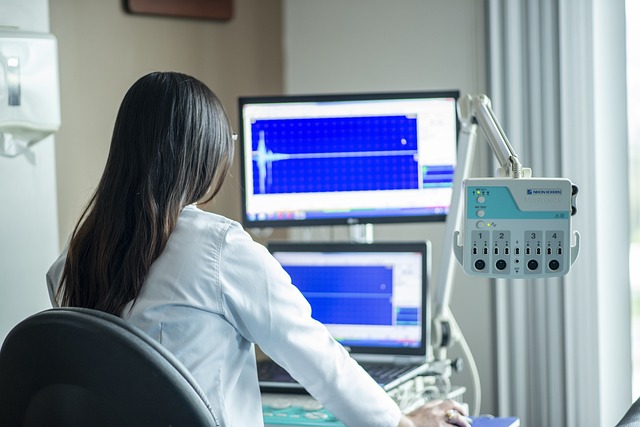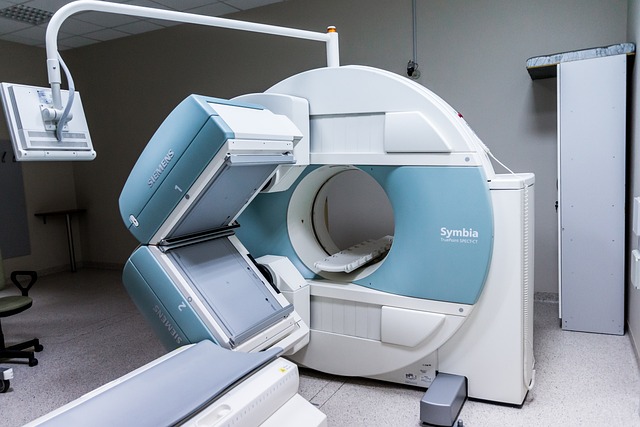Regenerative imaging leverages advanced imaging technology, such as MRI and ultrasound, to provide highly precise and non-invasive diagnostic tools. These tools enable personalized care plans in regenerative medicine by offering detailed insights into tissue regeneration processes. Precision imaging allows healthcare professionals to target interventions more effectively, enhancing success rates of regenerative treatments and revolutionizing healthcare practices. By utilizing these cutting-edge diagnostic services, physicians can make informed decisions based on advanced imaging results, ultimately improving patient outcomes through tailored regenerative therapies.
In the realm of regenerative medicine, advanced imaging technologies are revolutionizing patient care. This article delves into the intricacies of regenerative imaging, exploring its potential as a powerful diagnostic tool in this emerging field. We uncover the benefits of non-invasive diagnostics and precision imaging, which enhance safety and accuracy in regenerative treatments. From understanding regenerative imaging to interpreting complex data, this comprehensive guide covers essential aspects of medical imaging tools for optimal regenerative diagnostic services.
- Understanding Regenerative Imaging: Unlocking the Potential of Advanced Medical Scanning
- Diagnostic Tools in Regenerative Medicine: Non-Invasive Methods for Comprehensive Assessment
- The Role of Precision Imaging: Enhancing Accuracy and Safety in Regenerative Treatments
- Navigating Regenerative Imaging Results: Interpreting Data for Effective Patient Care
- Medical Imaging Tools for Regenerative Diagnostic Services: A Comprehensive Overview
Understanding Regenerative Imaging: Unlocking the Potential of Advanced Medical Scanning

Regenerative imaging represents a groundbreaking advancement in the field of medicine, offering powerful diagnostic tools to revolutionize healthcare. This innovative approach leverages advanced imaging technology to unlock the potential of regenerative medicine by providing highly precise insights into the body’s intricate processes and structures. With its ability to go beyond traditional medical scanning, regenerative imaging facilitates the development of more effective treatment strategies.
As a result, it has become an invaluable asset in clinical settings, enabling healthcare professionals to offer personalized care plans. Non-invasive diagnostics play a pivotal role here, ensuring patients undergo minimal risk procedures while still achieving detailed imaging results. Moreover, precision imaging allows for targeted interventions, enhancing the overall success rates of regenerative treatments. The integration of these advanced medical imaging tools into diagnostic services opens up exciting possibilities for future healthcare practices.
Diagnostic Tools in Regenerative Medicine: Non-Invasive Methods for Comprehensive Assessment

In the realm of regenerative medicine, advanced imaging technology plays a pivotal role in providing comprehensive assessments and guiding therapeutic interventions. Non-invasive diagnostics have emerged as powerful tools to visualize and monitor tissue regeneration, offering a glimpse into the intricate processes that occur during repair and restoration. These innovative medical imaging tools enable healthcare professionals to gain valuable insights into the microstructure and functional changes within damaged tissues or organs.
Precision imaging techniques, such as magnetic resonance imaging (MRI), ultrasound, and optical coherence tomography, are being harnessed to evaluate the progress of regenerative treatments. By employing these non-invasive methods, medical experts can assess the extent of tissue repair, identify signs of regeneration, and make informed decisions regarding patient care. Regenerative diagnostic services, powered by cutting-edge imaging technology, have revolutionized the way we approach regenerative therapies, ensuring more effective and personalized treatment strategies for various conditions.
The Role of Precision Imaging: Enhancing Accuracy and Safety in Regenerative Treatments

Precision imaging plays a pivotal role in advancing the field of regenerative medicine by enhancing both accuracy and safety in regenerative treatments. Advanced imaging technology, such as high-resolution magnetic resonance imaging (MRI) or computed tomography (CT), acts as powerful diagnostic tools in regenerative medicine. These non-invasive diagnostics enable medical professionals to visualize and assess tissue structure, cell growth, and functional changes with remarkable detail.
By utilizing advanced imaging for regenerative treatment planning and monitoring, physicians can make more informed decisions, ensuring targeted interventions and optimal patient outcomes. Regenerative diagnostic services that incorporate precision imaging provide valuable insights into the intricate processes of tissue regeneration, ultimately improving the overall effectiveness and safety of these cutting-edge treatments.
Navigating Regenerative Imaging Results: Interpreting Data for Effective Patient Care

Navigating Regenerative Imaging Results is a critical step in ensuring effective patient care within the field of regenerative medicine. Advanced imaging technology serves as powerful diagnostic tools, offering non-invasive means to visualise and assess tissue regeneration potential. Precision imaging techniques, such as magnetic resonance imaging (MRI) and ultrasound, play a pivotal role in interpreting the complex data generated by these innovative medical imaging tools.
Healthcare professionals must possess expertise in analysing regenerative imaging results to make informed decisions about patient treatment plans. This involves understanding the unique patterns and indicators revealed by advanced imaging, which can pinpoint areas of successful tissue regeneration or identify barriers hindering the process. By leveraging these insights, medical professionals can tailor regenerative diagnostic services to individual patients, maximising the benefits of imaging for regenerative treatments and ultimately enhancing overall healthcare outcomes.
Medical Imaging Tools for Regenerative Diagnostic Services: A Comprehensive Overview

Medical Imaging Tools for Regenerative Diagnostic Services play a pivotal role in advancing the field of regenerative medicine. Advanced imaging technology offers a suite of non-invasive diagnostics that enable precise evaluation of tissue regeneration and response to treatment. These tools are essential for navigating the complex landscape of regenerative diagnostic services, providing a comprehensive view of cellular activity, blood flow, and structural changes at various stages of healing.
Precision imaging techniques such as magnetic resonance imaging (MRI), computed tomography (CT), and ultrasound are being leveraged to track progress and tailor regenerative treatments accordingly. By integrating these advanced imaging tools, healthcare professionals can offer personalized care plans, enhancing patient outcomes and optimizing the efficiency of regenerative therapies. This comprehensive overview ensures that the latest medical imaging technologies are harnessed effectively for accurate diagnosis and successful treatment in the ever-evolving realm of regenerative medicine.
In conclusion, the expert interpretation of regenerative imaging results is pivotal to harnessing the full potential of advanced imaging technology in diagnostic and therapeutic contexts. Non-invasive diagnostics offer a robust framework for comprehensive assessment in regenerative medicine, while precision imaging ensures enhanced accuracy and safety during regenerative treatments. By leveraging medical imaging tools effectively, healthcare professionals can navigate complex regenerative imaging data, ultimately providing effective patient care through innovative regenerative diagnostic services.
